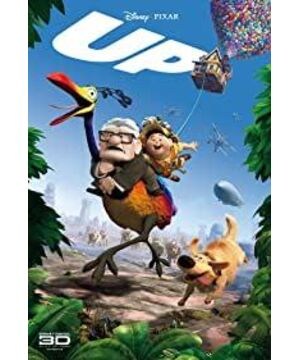The language of the video was so refined that the so-called "Ten minutes, old age", the opening of "Flying House Tour" took ten minutes, the balloon salesman Carl Frederickson's life experience from ignorance of a child to an elderly person Then it came to the screen. He and his beloved wife Ellie knew each other from the hobby of adventure, and then they fell in love with their childhood sweethearts. Although they have no children, they stay together for the rest of their lives. Now the old house will be demolished, and Karl will be sent to the nursing home. On the heart.
However, Carl refused to admit defeat. The adrenaline of his childhood had already turned into a tribute to his deceased wife. Therefore, the old man carefully planned a gorgeous adventure: he tied the old house full of balloons and wanted to take Ellie (the portrait) with him. The Paradise Falls adventure ever enjoyed by eachother.
Originally this was just a stubborn old man’s blood story, but the appearance of the little fat man Russell who was more troublesome than a philosopher changed everything-this member of the Adventure Association who wanted to get the "Helping the Elder Medal" was taken by Carl. "Unexpectedly" took it to the sky.
So I admire Dougert's character setting: animation, it must be rich and exaggerated, but also realistic. One old and one young, one white and one yellow, one lonely and one person is crazy. The starting point of life actually catches the last train of uncertain future. Shao said that the rivalry of the two protagonists will surely sparkle in the later journey.
The image of Russell is clearly in the eyes of the Chinese audience. The authentic Mongolian face and the cloth strip on the neck are officially marked by organizations such as the Adventure Association and Boy Scouts, but I look like a red scarf. The moment when Russell broke into Carl’s old house and asked for help reminded me of my childhood: the Young Pioneers organization in my elementary school would engage in activities to learn from Lei Feng and do good deeds every March. So, on weekends, we have a group of children. Bianshan gathered together with a tsunami, and then the whole compound made a gangster jump, and finally shouted at the adult who came out to scold: "We do good things without leaving a name, our name is Red Scarf!"——" The rhetoric of "borrowing" has been self-taught by us.
Does Russell hate it? Of course I hate it. I really want to find fault. This Asian boy is fat and ignorant. But Karl also has many shortcomings. When the flying house he built came up from the ground, it frightened the two social workers who came to take him to the nursing home. Not to mention, they wiped out other people's cars and hit the beams of other houses along the way.
However, no one will hate these two guys. When we sit in the cinema and watch a movie, we don’t have to demand a one-to-one correspondence with reality on the screen—especially when this is an animated fantasy film. When our children's movies use tall, big, complete idols and inexplicable moral preaching to discipline children (see "Looking for Jackie Chan"), those dogmas that even adults themselves do not believe will of course be easily handled in the online world. Spurred by the children-some of them do not "spurn" because many bad movies are so bad that the children don't even watch it.
In fact, good children's movies must be movies for all ages. Children like to watch, and adults will of course also like it. While the children cheered for the bizarre adventures in "A Tour of the Flying House", the adults were full of excitement for the satisfaction of their pseudo-bourgeois taste. Isn't Karl just a little white-collar worker who has been suppressed by work and life for a lifetime? I follow the rules and are not considered successful people, but they are also comfortable with food and clothing. However, the childhood adventure dreams have long since disappeared, but once the "bucket list" is included in the track of "old man chatting with teenagers", life seems to be full of passion again. More importantly, Carl is still a love saint. When deposits and housing become the primary conditions for choosing a spouse, and seeing such a consistent American love saint on the screen, the female audience will naturally give birth to a layer. Good impression-of course, this does not prevent them from continuing to ask the other party whether they bought a house when they go on a blind date after watching the movie.
There is nothing wrong with this. Movies are dream-making, they are all the same as reality, and I don't spend the wrong money to enter the theater. But the problem is, if the filmmakers want to pay from the audience's pockets, it's the name of the album by Gunslingers—use your imagination! The lack of imagination, first of all, lies in the failure to correct one's mentality. Don't treat the audience as an educated audience-the same is true for children. Only if the film is approved by them, can the content you infuse in it be accepted. And the children are not eager for a little sensory stimulation, as evidenced by the failure of "Fight and Clouds" last year. Furthermore, this is an era of emerging meaning. Most of the themes in the works are interpreted by the audience themselves. It is enough to manage things in the atmosphere. The ozone layer actually does not bother the directors.
Imagination comes from life. Li Zhi said that people must have a childlike innocence, and it is not difficult to say. Looking at our lives, in fact, stories that are more bizarre than movies happen every day. What is the old house flying in the "Flying House"? Didn’t you just get down on the thirteenth floor over there? The house slaves and the prospective house slaves who want to be house slaves have long gritted their teeth on the housing price. Here, watching Carl take his house around the world, it is estimated that it has satisfied the gloomy psychology of many people.
Imagination also comes from the details. The intensive work of "Flying House" is seen by the audience, and in addition to the pictures, the plot and dialogue are also full of Dougt's ingenuity. The big bird Snape, named "Kevin" by Russell, actually originated from Carl's little joke on Russell, and this accidental accident led to the crazy adventurer Mutz (at the same time taking care of Carl and Ai Li’s love for the first life); the big dogs raised by Mutz were made vivid by Dougt’s unique movement design. When parachuting escape, he did not forget to take care of the little jokes about squirrels; of course, with Mutz During the struggle between Carl and Russell, the friendship deepened, and Russell’s unintentional “These boring things are what I remember best” prompted the audience and Carl to examine the true meaning of life together; when the dust settled, Old Carl and Russell Jr. When sitting by the street together licking ice cream and counting the colors of the car, the audience's psychology has already been greatly satisfied.
Carl and Russell, who were full of shortcomings, captured the hearts of Chinese audiences. In fact, they are nothing more than Hollywood genre movies. The idea of the entire "Around the Flying House" must not escape the context of "Around the Earth in Eighty Days", and the last airship war scene reminded me of "City in the Sky" immediately. But this is not a criticism. I understand that the type of film you made is a compliment. Why are there types? That's because you find a model that meets the audience's requirements, and then learn and practice this model. This is the king of the big screen.
Imagination is the same thing as innovation, which means that there is no forbidden area for thinking. Of course, we can argue from the perspective of national culture that Chinese people have been lacking imagination almost since ancient times. This may be true. But globalization has been around for so many years. Since it is a "long-term skill", then we should "teach the barbarian." When we chant "innovation" all day, the backward and rigid self-judgment is self-evident. From the perspective of movies, there are six generations of climate. The first three generations were cultivated before the liberation. The fourth and fifth generations caught up with the blowout after the reform and opening up, and then they have been eating their laurels. I had no choice but to die). As for the sixth generation, the niche way used to confirm the pulse of foreign film festivals, but now it is also Wang Xiaoer's New Year, holding lions and bears back to China, but the audience has not bought it.
Film is an art (and industry) that especially requires imagination and innovation. I don't believe that a billion Chinese people cannot train filmmakers with imagination that can match Dougt. The key is to give them a relaxed environment and creative atmosphere as free as possible, and then let the market vote-I believe that the total Chinese audience must be much smarter than the relevant departments.
"Flying House Tour" is not perfect. In fact, I think the final ending of the film is a bit weak. From the beginning of the airship fight, it goes down a bit, which is a bit anticlimactic. But compared to the Chinese animations of "McDull" and "Pleasant Goat", I would still like to watch "Flying House and Traveling Around".
Still don't understand, who is killing our imagination in such a harmonious, stable, and free-of-view society?
(Southnet's special manuscript, welcome to reprint, must indicate the source of the author.)
View more about Up reviews











